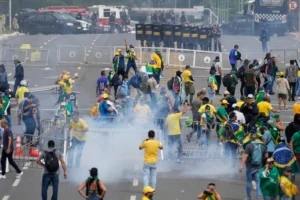The events of January 8, 2023, in Brazil, where significant unrest occurred at government buildings in Brasília, have sparked widespread discussion and differing opinions across the nation.
This variation in perception highlights a broad spectrum of viewpoints regarding the incident.
The survey highlights variations in viewpoints based on political affiliations. A greater proportion of former President Jair Bolsonaro‘s backers (77%) view the events as acts of vandalism.
Conversely, supporters of President Luiz Inácio Lula da Silva (52%) tend to perceive it more as a coup attempt.

Moreover, the data suggests that socio-economic factors may influence these perceptions, with individuals in higher income brackets more likely to view the events as a coup.
This legal approach contrasts with the majority of public opinion as captured by the survey, illustrating the complex dynamics at play between public perceptions and judicial actions.
The contrast between public sentiment and the judiciary’s characterization of the January 8th events has sparked debate within Brazilian society.
This discourse reflects broader discussions on the country’s democratic processes and the role of legal accountability.
As Brazil navigates these challenges, the differing narratives surrounding the January 8th incident underscore the importance of dialogue and reconciliation.

